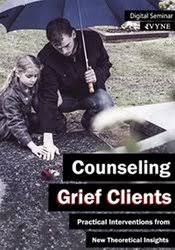Counseling Grief Clients: Practical Interventions from New Theoretical Insights – Beth Eckerd | Available Now !
$199.00 Original price was: $199.00.$56.00Current price is: $56.00.
Counseling Grief Clients: Practical Interventions from New Theoretical Insights – Beth Eckerd | INSTANTLY DOWNLOAD !
Clinicians often struggle to develop an effective approach to counseling grief clients, due to the uniqueness of each individual’s grief. The last 10-15 years have seen an explosion of new research in the field and many new studies have turned what we thought we knew on its head. Another important and very practical issue involves diagnosis, as DSM-5® revisions affect the most commonly applied diagnoses for grief clients.
Explore this new research, including up-to-date information about appropriate diagnosis of grief clients in DSM-5®, ideas for how to assess grief severity and related constructs, and clarification about what is meant by “complicated grief” with Licensed Psychologist and Certified Thanatologist, Dr. Beth Eckerd. Review the most commonly used current models for understanding grief and leave with tools, including 20 interventions, to more confidently assist clients in navigating the adaptive, yet confusing and difficult, grief process. The seminar will end with a focus on self-care, discussing how to appropriately manage and care for ourselves in this demanding, yet fulfilling, work.
- Articulate current models for conceptualizing grief for the purposes of client psychoeducation
- Identify five predictors of grief severity in clients
- Put to practical use in-session a basic, adaptable approach to grief counseling
- Demonstrate three new interventions to use with bereaved clients in a clincial session
- Determine when grief has become “complicated” and outline a suitable treatment strategy
- Diagnose grief clients appropriately using the DSM-5®/li>
WHAT RESEARCH TELLS US ABOUT GRIEF
- The cost of loving and caring
- Models for understanding grief
- Older, familiar models
- The “griefwork” hypothesis
- Kubler-Ross stages
- Current theories and approaches
- Attachment theory
- Phase and task models
- Meaning reconstruction
- Dual process model
- Continuing bonds
- Older, familiar models
- Expressions
- Emotional and cognitive expressions
- Physical manifestations
- Behavioral expressions
- Social behaviors and societal reactions
- Predictors and mediators of the experience
- Background: grief is highly individual
- Personality and other vulnerability factors
- Who died; quality of relationship
- Social, contextual, and cultural influences
- Mode of death
- Other influences
- Non-death losses
ASSISTING OUR CLIENTS THROUGH THE JOURNEY OF GRIEF
- Grief counseling
- How is it different from other types of counseling?
- Who often benefits (and who may not)?
- Components of a general approach
- The 3 Rogerian conditions
- Power of presence
- Being a companion/therapist for your grief clients
- Cross-cultural and other diversity considerations
- Dealing with emotional intensity
- Grief vs. trauma
- Interventions
- When clients’ grief is disenfranchised
- Working with couples or families who have experienced the “same” loss
- Preparing for grief “spikes”
- Post-traumatic growth
WHEN GRIEF BECOMES COMPLICATED
- Common trajectories for grief
- What is “complicated” grief and how do you recognize it?
- Risk factors for complicated grief
- Overview of treatments for complicated grief
ASSESSMENT AND DIAGNOSIS OF GRIEF-RELATED SYMPTOMS
- How to differentiate between depression, grief, and PTSD
- Persistent Complex Bereavement Disorder
- Use of Adjustment Disorder diagnosis with grief clients
- Measurement/assessment of grief
BEING A GRIEF COUNSELOR
- The risks and joys of this work
- Self-awareness
- Self-care
- Training opportunities in this field
Tag: Counseling Grief Clients: Practical Interventions from New Theoretical Insights – Beth Eckerd Review. Counseling Grief Clients: Practical Interventions from New Theoretical Insights – Beth Eckerd download. Counseling Grief Clients: Practical Interventions from New Theoretical Insights – Beth Eckerd discount.
1 review for Counseling Grief Clients: Practical Interventions from New Theoretical Insights – Beth Eckerd | Available Now !
Add a review Cancel reply
Related products
NLP & Hypnosis
NLP & Hypnosis
Ecommerce
Ecommerce
Ecommerce
Ecommerce
NLP & Hypnosis












Celia Townsend –
excellent as described, fast delivery A++++ | Counseling Grief Clients: Practical Interventions from New Theoretical Insights – Beth Eckerd